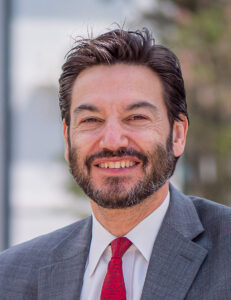Writer: Victor Cabrera
 2 min read November 2022 — Concerns over workforce shortages remain top of mind for industry leaders across all sectors of the economy. As the training grounds for the future workforce, higher education institutions are taking steps to equip the next generation of workers with the skills they need to pursue gainful careers and to fill crucial roles in key sectors.
2 min read November 2022 — Concerns over workforce shortages remain top of mind for industry leaders across all sectors of the economy. As the training grounds for the future workforce, higher education institutions are taking steps to equip the next generation of workers with the skills they need to pursue gainful careers and to fill crucial roles in key sectors.
Scott Shaw, president and CEO of Lincoln Tech, and Jonathan Koppell, president of Montclair State University, shared their thoughts with Invest: on the current state of the higher education sector and its role in improving the state of the American workforce.
What are some of the key highlights for your institution and the higher education sector in North and Central Jersey?

Scott Shaw: I think the future is quite bright for us. As a vocational trainer, industry demand is going to dramatically increase from here. We’re not bringing enough people in as quickly as they’re retiring. With the amount of money that we as a country are going to be spending on our infrastructure rebuild, it’s going to require thousands of new people in these fields. That will be good for us as an organization as we try to figure out how we can satisfy those needs, both here in New Jersey and around the country. More and more people are looking for shorter, faster ways to get some skills and get into the workforce. I think more people on the margin are thinking about the skilled trades and vocational training more than they have in the past. That should hopefully encourage more people to go to schools like Lincoln Tech and others to help build the workforce that our economy needs, both today and going forward.
 Jonathan Koppell: The headline item is that our enrollments are robust. We hear a lot about plummeting enrollments nationally but at Montclair State University, we have record enrollments and the largest incoming class in our history this year. This is exciting and gratifying because as students are becoming more discerning about where to go to college; they look at Montclair as an institution where they can thrive. The graduation rates are much higher here than at peer universities while we maintain low cost and high quality. We have people from 39 states attending Montclair, which is also a new record.
Jonathan Koppell: The headline item is that our enrollments are robust. We hear a lot about plummeting enrollments nationally but at Montclair State University, we have record enrollments and the largest incoming class in our history this year. This is exciting and gratifying because as students are becoming more discerning about where to go to college; they look at Montclair as an institution where they can thrive. The graduation rates are much higher here than at peer universities while we maintain low cost and high quality. We have people from 39 states attending Montclair, which is also a new record.
What are the roles that universities can play in spurring the development of the national economy and of their local workforces?
Shaw: The priorities remain focused on creating skilled workers. We have employers that are coming to us desperate to find people. There are two jobs for every unemployed person and it’s either people just don’t seem to want to work or they don’t have the skills needed. We obviously have a huge skills gap out there. One of the problems we face is the fact that for over 40 years as a country, we started to push and encourage everyone to go to college. In the process of pushing everyone in that direction, we neglected the fact that we as a country and as an economy need people who work with their hands. We’re not giving these people an opportunity to know about these types of careers, to know if they have a skill set that would be very conducive to making them successful. By taking these programs out of our high schools, we now have two generations of individuals who don’t know what these jobs entail or if they have the aptitude to be successful.
Koppell: If you look at states that have dynamic, growing economies that offer high-opportunity jobs, they all have multiple dynamic research universities. This is because universities create ideas, technologies and companies. They bring in millions of dollars in research, which is a catalyst for business and economic development. In New Jersey, we need to follow the model of Texas and Florida which have grown by cultivating multiple high-performing research universities. We have invested heavily in a couple of universities. For New Jersey to achieve this scale of higher education-driven economic activity, we need to see growth at more universities, including Montclair.
What shift in expectations have you seen across your students?
Shaw: People are realizing that college is very expensive. The loan forgiveness that’s taking place just highlights again that people are taking on more debt than the field in which they studied warrants. Our programs are much shorter in nature, students end up with lower amounts of debt and all the careers that we offer are in demand.
We are seeing employers starting to be more creative in providing more signing bonuses and tuition reimbursement plans, and they are more willing to get involved in the training so that the students have skills that are more specific to a particular industry or company. I cannot emphasize how often we hear employers saying that their growth is being stymied because they can’t find enough people and yet, they’re not willing to make bigger investments to try to get these people on board. There’s too much fear that people won’t stay long enough in a job for the employer to get a return on their investment, but you’ll be better off and end up with more talent that will serve your company better if you do make these types of investments in training
Koppell: We want to be known as a university that cultivates and supports the public service impulse in students. The current generation is more idealistic and change-oriented than any generation before and we need to embrace that. We have a set of public service programs and initiatives, including the Next Generation Service Corps, which is a four-year public service program. It prepares students for a lifetime of public service and we work with a national network of other universities that are moving toward this goal. We already have a rich ecosystem of public service programs and I am very impressed by the passion of our students. Also, I am a big believer that promoting service and civic engagement has a positive effect on social cohesion. It allows people to interact with others that they would not usually interact with. We have done a good job of promoting the idea that democracy requires interaction and engagement and we have an incredibly respectful and positive culture here.
For more information, visit:

